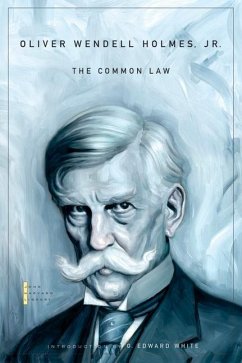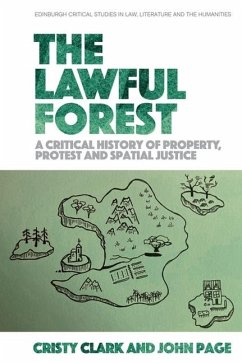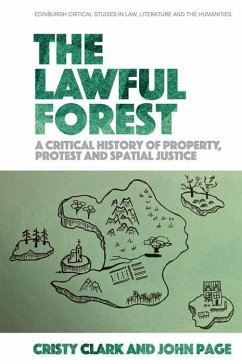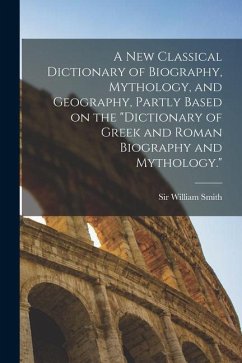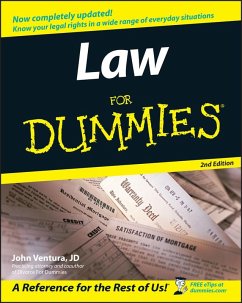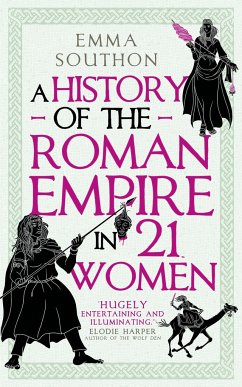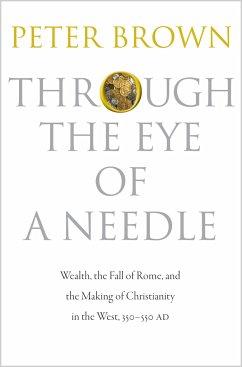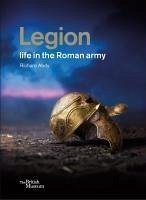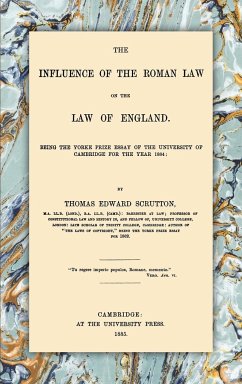
The Influence of the Roman Law on the Law of England
Versandkostenfrei!
Versandfertig in 1-2 Wochen
35,99 €
inkl. MwSt.
Weitere Ausgaben:

PAYBACK Punkte
18 °P sammeln!
The extent of Roman influence on English common law, long a keenly debated topic, was subjected to careful scrutiny during the establishment of modern English legal historiography in the late 1800s. Scrutton's revisionist essay, a path-breaking work that won Cambridge University's prestigious Yorke Prize, evaluates and mostly discredits the work of his predecessors, most notably Finlason, Coote and Seebohm. In its place he offers a history from the Saxon period to his day guided by a close reading of sources. Scrutton believed that Roman law was a minor influence until it was introduced to Oxf...
The extent of Roman influence on English common law, long a keenly debated topic, was subjected to careful scrutiny during the establishment of modern English legal historiography in the late 1800s. Scrutton's revisionist essay, a path-breaking work that won Cambridge University's prestigious Yorke Prize, evaluates and mostly discredits the work of his predecessors, most notably Finlason, Coote and Seebohm. In its place he offers a history from the Saxon period to his day guided by a close reading of sources. Scrutton believed that Roman law was a minor influence until it was introduced to Oxford by Vacarius. It became considerable after that watershed event, an argument he advances through a close reading of Glanville and a book-by-book demonstration of Azo's influence on Bracton. Reprint of the sole edition. "[Scrutton] has written what we believe to be the best essay on this subject.... It will be a useful guide to the authorities for any who are investigating the history of our law, while the author's own opinions are for the most part sound and sober, and are clearly and modestly stated." Law Quarterly Review 2 (1886) 96 Thomas Edward Scrutton [1856-1934] was an English jurist and writer. After a career in commercial law he became a judge of the King's Bench Division and of the Court of Appeal. He wrote the still standard The Contract of Affreightment as Expressed in Charterparties and Bills of Lading (1886) and an important treatise on English copyright law, The Law of Copyright (1883). CONTENTS INTRODUCTION PART I. ROMAN INFLUENCES OF ENGLISH LAW BEFORE THE COMING OF VACARIUS CHAPTER I. The Sources of the Roman Law CHAPTER II. The Claims of the Roman Law CHAPTER III. Roman Law in the Early Land Law Mr Seebohm's Manorial Theory CHAPTER IV. Roman Law in the Early Family Law CHAPTER V. Roman Law in Early Procedure CHAPTER VI. Roman Law in the Early Constitution Part I. Shires and Hundreds Part II. Towns and Gilds CHAPTER VII. Roman Law and the Norman Conquest CHAPTER VIII. Summary PART II. ROMAN INFLUENCES IN ENGLISH LAW AFTER THE COMING OF VACARIUS CHAPTER I. The Introduction of the Roman Law CHAPTER II. Roman Law in Glanvil CHAPTER III. Roman Law in Bracton Bracton's First Book: on Persons Bracton's Second Book: on Property Bracton's Third Book: on Contracts and Actions Criminal Law Remainder of Bracton Results CHAPTER IV. Roman Law in Britton and Fleta CHAPTER V. Roman Law from Fleta to Coke. CHAPTER VI. Roman Law in Coke CHAPTER VII. Authority of Bracton since Coke CHAPTER VIII. Roman Law; its authority in Hale and Blackstone CHAPTER IX. Roman Law in Blackstone CHAPTER X. Summary of Roman Law in Text-writers CHAPTER XI. Roman Law in the Chancery CHAPTER XII. Roman Law in the Ecclesiastical Courts CHAPTER XIII. Roman Law in the Admiralty CHAPTER XIV. Roman Law in the Law Merchant CHAPTER XV. Roman Law in the Common Law Conclusion Index





